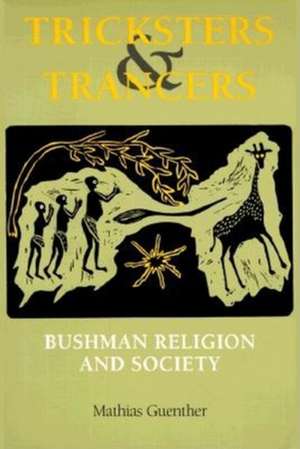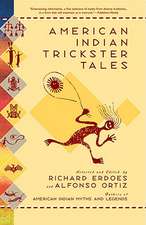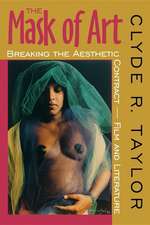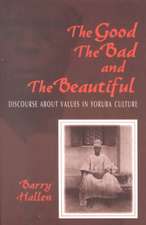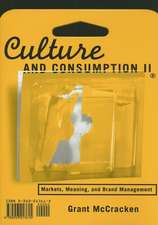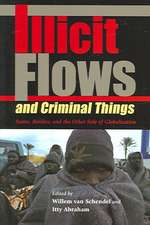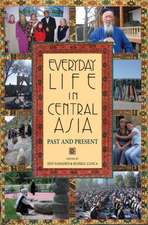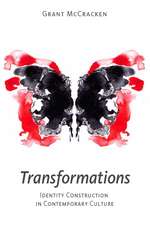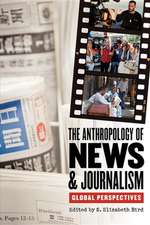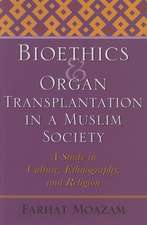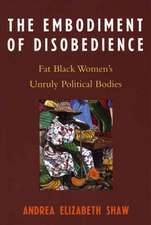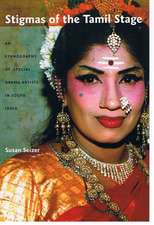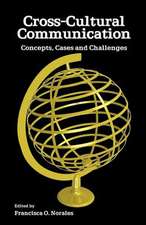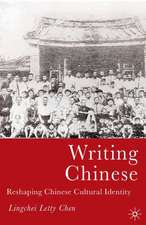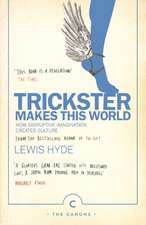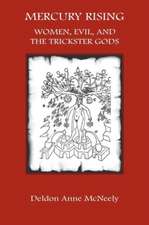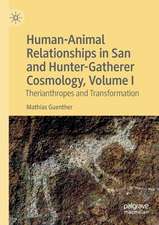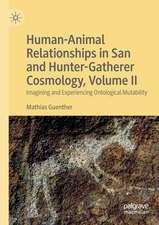Tricksters and Trancers – Bushman Religion and Society
Autor Mathias Guentheren Limba Engleză Paperback – 21 noi 1999
The hallmark features of Bushman religion--fluidity, flexibility, and adaptability, are also the (anti)structural components of Bushman society and ethos. In hunting and gathering societies such as the Bushmen, these characteristics pervade all of the other cultural domains. The similarity between society and religion provides the key for understanding the persistence of a system of belief based on ambiguity. An experience-rooted analysis of Bushman society and religion is contrasted with other anthropological approaches to ambiguity which are biased towards a rational structure and, as a result, fail to grasp a cultures antistructural tendencies. In order to convey both the diversity and the dynamism of Bushman religion and society, this study presents information on Bushman groups from all over southern Africa, derived both from recent ethnographic studies and early missionary writings.
Preț: 198.64 lei
Nou
Puncte Express: 298
Preț estimativ în valută:
38.01€ • 39.68$ • 31.46£
38.01€ • 39.68$ • 31.46£
Carte tipărită la comandă
Livrare economică 04-18 aprilie
Preluare comenzi: 021 569.72.76
Specificații
ISBN-13: 9780253213440
ISBN-10: 0253213444
Pagini: 304
Ilustrații: 10b&w photgraphs, 2 maps
Dimensiuni: 153 x 228 x 22 mm
Greutate: 0.51 kg
Editura: MH – Indiana University Press
ISBN-10: 0253213444
Pagini: 304
Ilustrații: 10b&w photgraphs, 2 maps
Dimensiuni: 153 x 228 x 22 mm
Greutate: 0.51 kg
Editura: MH – Indiana University Press
Cuprins
Table of contents:
Preface
Chapter 1: Introduction: The Challenge of Bushman Religion
The Challenge of Bushman Religion
Bushman Religion: A Brief Summary
Notes on Methodology and Orthography
Chapter 2: Bushman Society
Nharo Society, 1790's to 1890's
Nharo Society, 1890's to 1990's
Bushman Social Organization
Chapter 3: Values and Individuals
Values
The Individual
Bushman Societies Struggle of Society against the State
Chapter 4: Belief and Cosmology
The Diversity and Ambiguity of Bushman Belief
Divinity
Mantis and Moon Worship?
Cosmogony: Primal Time
Cosmology: The Human-Animal Nexus
Ambiguity of Bushman Religion: Social and Cultural Factors
Social-Structural Factors:
Cognitive-Cultural Factors:
"Foraging for Ideas": The Factor of Acculturation
Socio-Cultural Change and Bushman Religion
Chapter 5: The Trickster
The Trickster's Many Faces
The Embodiment of Ambiguity
The Trickster as God
//Gauwa Meets Jesus Christ
The Abomination of the Trickster God
Chapter 6: Stories, Story Telling and Story Gathering:
The Case of the Moon and the Hare
Textual Variation of the Myth
Story Transmission and the Foraging Ethos
Foraging Ideology or Ideology of Foraging?
The Text and Its Meaning
Chapter 7: Myth and Gender
Gender Relations in Bushman Society
Gender Relations in Bushman Myth and Lore
The Equality of Bushmen and Women
The Limitations of Structural Analysis
Chapter 8: Initiation Rites
Female Initiation
Male Initiation
Variations
Male Initiation or Hunting Magic?
Transition and Transformation
Transformation, Anti-Structure and Egalitarianism
Chapter 9: The Trance Dance
Liminality, Transformation and Transcendence
The Trance Dance and Cultural Revitalization
Flexibility, Adaptability and Variability of Bushman Ritual
Chapter 10: Missionaries and the Bushmen
The Bushman Mission in the Cape at Colonial Times
The Failure of the Cape Mission
Contemporary Missions to Bushmen
Two Incongruous Belief Systems
Chapter 11: Conclusion: Bushman Religion and the Tolerance of Ambiguity
Coping with Ambiguity
Bushman Society and Religion as Communitas and Anti-Structure
Do the Bushmen (and Hunter-Gatherers) Have Societies?
The Analytical and Methodological Challenge of Ambiguity
References Cited; Endnotes; Index
Preface
Chapter 1: Introduction: The Challenge of Bushman Religion
The Challenge of Bushman Religion
Bushman Religion: A Brief Summary
Notes on Methodology and Orthography
Chapter 2: Bushman Society
Nharo Society, 1790's to 1890's
Nharo Society, 1890's to 1990's
Bushman Social Organization
Chapter 3: Values and Individuals
Values
The Individual
Bushman Societies Struggle of Society against the State
Chapter 4: Belief and Cosmology
The Diversity and Ambiguity of Bushman Belief
Divinity
Mantis and Moon Worship?
Cosmogony: Primal Time
Cosmology: The Human-Animal Nexus
Ambiguity of Bushman Religion: Social and Cultural Factors
Social-Structural Factors:
Cognitive-Cultural Factors:
"Foraging for Ideas": The Factor of Acculturation
Socio-Cultural Change and Bushman Religion
Chapter 5: The Trickster
The Trickster's Many Faces
The Embodiment of Ambiguity
The Trickster as God
//Gauwa Meets Jesus Christ
The Abomination of the Trickster God
Chapter 6: Stories, Story Telling and Story Gathering:
The Case of the Moon and the Hare
Textual Variation of the Myth
Story Transmission and the Foraging Ethos
Foraging Ideology or Ideology of Foraging?
The Text and Its Meaning
Chapter 7: Myth and Gender
Gender Relations in Bushman Society
Gender Relations in Bushman Myth and Lore
The Equality of Bushmen and Women
The Limitations of Structural Analysis
Chapter 8: Initiation Rites
Female Initiation
Male Initiation
Variations
Male Initiation or Hunting Magic?
Transition and Transformation
Transformation, Anti-Structure and Egalitarianism
Chapter 9: The Trance Dance
Liminality, Transformation and Transcendence
The Trance Dance and Cultural Revitalization
Flexibility, Adaptability and Variability of Bushman Ritual
Chapter 10: Missionaries and the Bushmen
The Bushman Mission in the Cape at Colonial Times
The Failure of the Cape Mission
Contemporary Missions to Bushmen
Two Incongruous Belief Systems
Chapter 11: Conclusion: Bushman Religion and the Tolerance of Ambiguity
Coping with Ambiguity
Bushman Society and Religion as Communitas and Anti-Structure
Do the Bushmen (and Hunter-Gatherers) Have Societies?
The Analytical and Methodological Challenge of Ambiguity
References Cited; Endnotes; Index
Recenzii
Despite the voluminous material on Botswana's Bushman (the contentious ethnic label knowingly adopted by the author), this is an important contribution for a number of reasons. First, Guenther (Wilfrid Univ., Canada) provides an invaluable summary and commentary on the multilingual literature on these people. Second, and more important, the text takes up the topic of Bushman religion and cosmology, which, like its social organization, is fluid and varied. In discussing this relatively neglected concern, the author pays particular attention to the significance of the trickster, an ambiguous and disorderly creature from the beginning of time in indigenous thought, and the trance state, an important feature of Bushman ritual system. The value of Guenther's long-term fieldwork among a segment of these people is clearly demonstrated in his examination of these topics and in their relationship to gender issues. He concludes with a suggestion for anthropologists to pay greater heed to the relevance of ambiguity in Bushman society and cosmology but does not mention the theoretical work of Simmel in this context. Otherwise, this is a first-rate piece of scholarship. Upper-division undergraduates and above.W. Arens, SUNY at Stony Brook, 2000jul CHOICE.--W. Arens, SUNY at Stony Brook, 2000jul CHOICE.
Descriere
A study of belief, myth and ritual in Bushman culture
